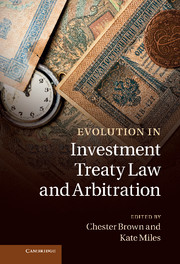Book contents
- Frontmatter
- Contents
- Contributors
- Editors' preface and acknowledgements
- Table of cases
- Table of Treaties
- Part I Introduction
- Part II Shifts in fundamental character
- Part III Actors in international investment law
- 8 Sovereign wealth funds and international investment law
- 9 Investor misconduct: Jurisdiction, admissibility or merits?
- 10 The European Union as a global investment partner: Law, policy and rhetoric in the attainment of development assistance and market liberalisation?
- 11 The ‘fair and equitable treatment’ standard and the circumstances of the host State
- 12 The plea of necessity under customary international law: A critical review in light of the Argentine cases
- 13 Making way for the public interest in international investment agreements
- 14 The participation of sub-national government units as amici curiae in international investment disputes
- Part IV The new significance of procedure
- Part V Engagement with cross-cutting issues
- Part VI Conclusions
- Index
- References
8 - Sovereign wealth funds and international investment law
from Part III - Actors in international investment law
Published online by Cambridge University Press: 05 December 2011
- Frontmatter
- Contents
- Contributors
- Editors' preface and acknowledgements
- Table of cases
- Table of Treaties
- Part I Introduction
- Part II Shifts in fundamental character
- Part III Actors in international investment law
- 8 Sovereign wealth funds and international investment law
- 9 Investor misconduct: Jurisdiction, admissibility or merits?
- 10 The European Union as a global investment partner: Law, policy and rhetoric in the attainment of development assistance and market liberalisation?
- 11 The ‘fair and equitable treatment’ standard and the circumstances of the host State
- 12 The plea of necessity under customary international law: A critical review in light of the Argentine cases
- 13 Making way for the public interest in international investment agreements
- 14 The participation of sub-national government units as amici curiae in international investment disputes
- Part IV The new significance of procedure
- Part V Engagement with cross-cutting issues
- Part VI Conclusions
- Index
- References
Summary
Introduction
Sovereign wealth funds (SWFs) have increasingly come under scrutiny in recent years because of both their size and their investment strategies. States and international organisations have attempted to react to the surge of SWFs by enacting barriers to these investments. Yet, it is questionable whether these measures, in particular national laws, comply with the obligations of States under international investment law.
This chapter aims to analyse whether SWFs may have recourse against national protectionist measures under international investment agreements. It is structured as follows. Section II describes the growth in SWF cross-border activity and resulting national security and economic concerns of the host States in which SWFs have invested. Section III considers conflicting approaches to regulating SWF activity. The tension between the need to maintain capital inflows from SWFs, on the one hand, and to address legitimate national security concerns of host States, on the other hand, has led to a mix of ‘hard law’ and ‘soft law’ regulatory approaches. Soft law initiatives developed by the Organisation for Economic Cooperation and Development (OECD) and the International Monetary Fund (IMF) have been intended to counter protectionist measures taken by States against SWFs. Section IV analyses whether SWFs may have recourse against such protectionist measures under international investment agreements, in particular bilateral investment treaties (BITs). The analysis will focus on three main issues. The first issue is whether SWFs and their investments are covered by the terms ‘investor’ and ‘investment’ under typical BIT definitions. The second issue is whether the temporal dimension of BITs provides coverage for SWFs against protectionist measures. Since most BITs provide protection only after the establishment of an investment, it may be that State measures against SWFs, aimed at the pre-establishment phase, fall outside the scope of most BITs. The third issue is whether a host State may invoke ‘essential security’ or similar exceptions in BITs or customary international law to defend its protectionist measures. Section V concludes.
- Type
- Chapter
- Information
- Evolution in Investment Treaty Law and Arbitration , pp. 163 - 186Publisher: Cambridge University PressPrint publication year: 2011
References
- 6
- Cited by

